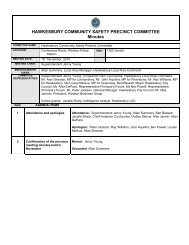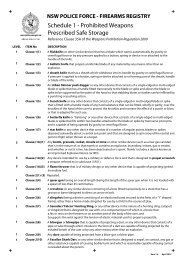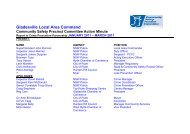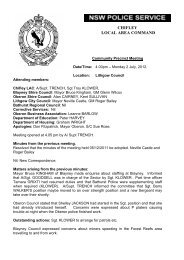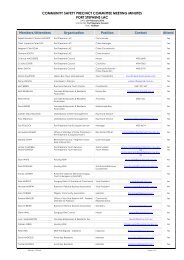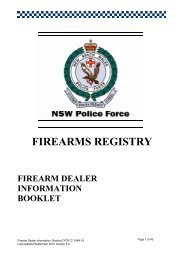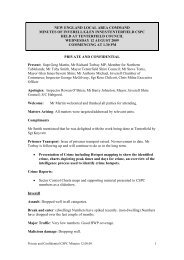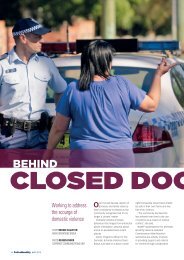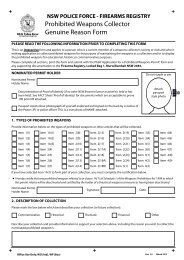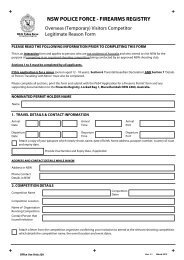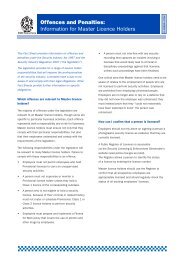Cautioning Aboriginal Young People (Brochure) - NSW Police Force
Cautioning Aboriginal Young People (Brochure) - NSW Police Force
Cautioning Aboriginal Young People (Brochure) - NSW Police Force
Create successful ePaper yourself
Turn your PDF publications into a flip-book with our unique Google optimized e-Paper software.
Legal Advice<br />
<strong>Young</strong> people who are alleged to have committed an offence<br />
are entitled to be informed of their right to obtain legal<br />
advice and to have the opportunity to obtain that advice.<br />
L E T ’ S W O R K I N P A R T N E R S H I P T O<br />
keep our mob out of custody<br />
Legal Aid Hotline for<br />
Under 18s<br />
1800 10 18 10<br />
Monday to Thursday<br />
9am – Midnight<br />
Fridays, Saturdays, Sundays<br />
and Public Holidays<br />
– 24 hours.<br />
<strong>Aboriginal</strong> Legal Services<br />
(02) 9621 1653 (Blacktown)<br />
(02) 4474 2400 (Moruya)<br />
(02) 4422 3255 (Nowra)<br />
(02) 9318 2122 (Redfern)<br />
(02) 4225 7977 (Wollongong)<br />
Albury Wodonga<br />
Community Legal Service<br />
(02) 6056 8210<br />
Central Coast Community<br />
Legal Centre, Wyong<br />
(02) 4353 4988<br />
Elizabeth Evatt Community<br />
Legal Centre, Katoomba<br />
(02) 4782 4155<br />
Far West Community Legal<br />
Centre, Broken Hill<br />
(08) 8088 2020<br />
or 1800 300 036<br />
Hawkesbury-Nepean<br />
Community Legal Centre,<br />
Richmond<br />
(02) 4588 5618<br />
Hunter Community Legal<br />
Centre, Newcastle<br />
(02) 4926 3220 or<br />
1800 650 073 (rural callers)<br />
Illawarra Legal Centre,<br />
Warrawong<br />
(02) 4276 2535<br />
Inner City Legal Centre,<br />
Darlinghurst<br />
(02) 9332 1966<br />
Kingsford Legal Centre,<br />
(02) 9385 9572<br />
Macarthur Legal Centre,<br />
Campbelltown<br />
(02) 4628 2042<br />
Marrickville Legal Centre,<br />
(02) 9559 2899<br />
Mt Druitt Area Community<br />
Legal Centre, Rooty Hill<br />
(02) 9675 2110<br />
National Children’s and<br />
Youth Law Centre<br />
(02) 9385 9588<br />
North and North West<br />
Community Legal Service,<br />
Armidale<br />
(02) 6772 8100<br />
or 1800 687 687<br />
Northern Rivers Community<br />
Legal Centre, Lismore<br />
(02) 6621 1000<br />
or 1800 689 889<br />
Shopfront Youth Legal<br />
Centre, Darlinghurst<br />
(02) 9360 1847<br />
or 0418 407 290<br />
Western <strong>NSW</strong> Community<br />
Legal Centre, Dubbo<br />
(02) 6884 9422<br />
or 1800 655 927<br />
PAB 07/07<br />
<strong>Cautioning</strong><br />
ABORIGINAL YOUNG PEOPLE<br />
T H E Y O U N G<br />
O F F E N D E R S<br />
A C T 1 9 9 7<br />
( C O N S U LT<br />
T H E A C T F O R<br />
F U R T H E R<br />
D E T A I L S )
N S W P O L I C E F O R C E <strong>Aboriginal</strong> Strategic Direction 2 0 0 7 – 2 0 1 1<br />
<strong>Cautioning</strong><br />
The <strong>Young</strong> Offenders<br />
Act 1997<br />
The <strong>Young</strong> Offenders Act in relation to cautioning young<br />
people MUST be considered for every young person aged<br />
between 10 and 18 years when they commit an offence.<br />
When a young person is arrested and taken into custody<br />
they are entitled to obtain legal advice/representation and<br />
have a legal guardian or support person present during an<br />
interview. After obtaining legal advice and talking to a<br />
legal guardian or support person the young person can<br />
proceed in the way of a Caution if the Investigating Officer<br />
thinks it is appropriate and if the young person admits to<br />
and consents to the Caution.<br />
Offences covered under<br />
the Act<br />
Include Summary matters or indictable matters such as:<br />
• damaging property<br />
• stealing<br />
• malicious damage<br />
• assault<br />
• summary drug offences (involving less than a small<br />
quantity of drug).<br />
What is considered when<br />
the Investigating Officer<br />
gives a caution<br />
• Seriousness of the offence;<br />
• Degree of violence involved in the offence;<br />
• Harm caused to the victims;<br />
• Number and nature of the offence;<br />
• A young person can commit numerous offences on the<br />
same occasion and receive a caution covering all the<br />
offences;<br />
• A young person is not entitled to have a caution if<br />
he/she has already received three prior cautions;<br />
• Any other matter the Investigating Officer thinks is<br />
appropriate in the circumstances.<br />
How does a young person<br />
receive a Caution<br />
A written notice will be given to the young person<br />
containing relevant information that the young person<br />
needs to know.<br />
The information will contain:<br />
• The offence for which the caution is given;<br />
• <strong>People</strong> who may be present at the caution, and may<br />
include a person responsible for the child, an adult<br />
present with the consent of a person responsible for<br />
the young person or a legal practitioner chosen by the<br />
young person;<br />
• Time, date and place of caution;<br />
• Name of <strong>Police</strong> Officer who will be giving the caution;<br />
• Consequences if the young person fails to attend;<br />
• The rights of the young person to obtain legal advice.<br />
Persons who may give<br />
a Caution<br />
A caution can be given by <strong>Police</strong> Youth Liaison Officer or<br />
a respected member of the <strong>Aboriginal</strong> community who<br />
has been trained to give a Caution.<br />
What is involved in<br />
a Caution<br />
Cautions can take up an hour and may involve a written<br />
apology to the victim. A caution will generally involve the<br />
following steps:<br />
• Introductions<br />
• Explanation of the reason for the caution<br />
• Exploration of the offence – what happened; why;<br />
impact of offence on young person, family or support<br />
person, victim and community; and consequences of<br />
future offending;<br />
• Cautions for drug matters might include discussion of<br />
health, social and legal implications of illicit drug use<br />
and the provision of written information.<br />
• Identify how to avoid future offending and acknowledge<br />
that a formal police record exists for the matter.<br />
<strong>Cautioning</strong>



